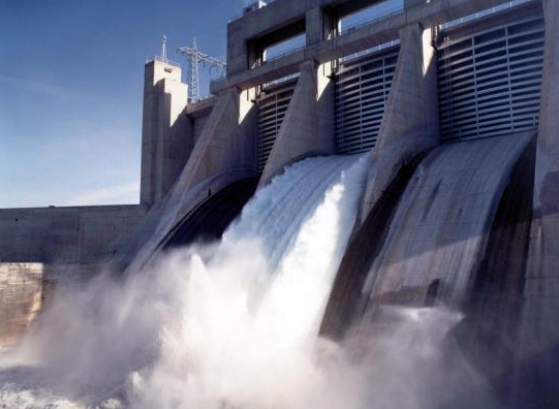
- Details
- By Levi Rickert
The Department of the Interior on Tuesday announced a $27 million investment from President Biden’s Investing in America agenda to protect Tribal communities by repairing and upgrading clean water systems and replacing failing dams.
The President’s Investing in America agenda is deploying record investments to provide affordable high-speed internet, safer roads and bridges, modern wastewater and sanitations systems, clean drinking water, reliable and affordable electricity, good paying jobs and economic development in every tribal community.
The Bipartisan Infrastructure Law alone invests $13 billion directly to American Indian and Alaska Native tribal communities throughout the United States, including $250 million over five years for Tribal dams and water projects.
“Through President Biden’s Bipartisan Infrastructure Law, we are making critical infrastructure investments in Tribal communities across the country,” Interior Secretary Deb Haaland said. “In addition to the resources we have allocated for irrigation power systems and water sanitation systems in Indian Country, today’s announcement will further safeguard Tribal water supplies, particularly in the face of persistent drought conditions across the West.”
“Dam safety and water sanitation projects are crucial to ensuring the health, safety and prosperity of Indigenous communities,” said Assistant Secretary for Indian Affairs Bryan Newland. “Through the Investing in America agenda, we are investing critical funding to repair and revitalize infrastructure facilities in Tribal communities throughout Indian Country, advancing economic opportunities for Tribes and expanding access to clean, reliable drinking water for Indigenous families.”
The announcement follows the White House Tribal Nations Summit, held earlier this month, which highlighted ways in which the federal government is investing in Indian Country and strengthening nation-to-nation relationships.
Through today’s announcement, the Bureau of Indian Affairs (BIA) will allocate $22.3 million to address known dam safety deficiencies. This includes:
- $12 million for Oglala Dam on the Pine Ridge Reservation in South Dakota, bringing the total funding allocated for this project to $78 million, including $68 million in Bipartisan Infrastructure Law funding.
- $10.3 million towards construction of the Menager Dam on the Tohono O’odham Nation Reservation in southern Arizona. The complete replacement of the dam will provide for improved safety and substantial flood protection for downstream communities.
The BIA is also investing $4.39 million for vital repairs and upgrades for BIA-owned water systems. Funds will be used to ensure compliance with Environmental Protection Agency Safe Drinking Water Act standards, reduce critical risks of system failure, and complete system upgrades needed to continue providing safe and clean drinking water.
This funding includes:
- $4.14 million to address water sanitation needs at Columbia River Treaty Fishing Access sites in the Pacific Northwest, including new investments of $2.9 million at the Cooks In-Lieu site and $1.2 million at the North Bonneville site.
- $250,000 for improvements at the North Idaho Public Water System, which serves the Nez Perce Reservation. This is in addition to prior investments of $3 million.
These water systems projects build on over $19 million already invested in 2022 and 2023 for engineering, design services and construction.
For more information, visit the BIA’s interactive map on projects in Tribal communities funded through the bureau under the Bipartisan Infrastructure Law.
More Stories Like This
50 Years of Self-Determination: How a Landmark Act Empowered Tribal Sovereignty and Transformed Federal-Tribal RelationsUnited Indian Nations of Oklahoma to Hold Annual Meeting in Oklahoma City Nov. 6
Dakota Wicohan Receives 2025 Greater Minnesota Bush Prize for Dakota Language Revitalization
Senate Committee on Indians Affairs Hear How Tribes Turn to Natural Resources as Federal Shutdown Deepens Food Insecurity
Cherokee Nation Declares Food Emergency Due to Federal Shutdown
Help us tell the stories that could save Native languages and food traditions
At a critical moment for Indian Country, Native News Online is embarking on our most ambitious reporting project yet: "Cultivating Culture," a three-year investigation into two forces shaping Native community survival—food sovereignty and language revitalization.
The devastating impact of COVID-19 accelerated the loss of Native elders and with them, irreplaceable cultural knowledge. Yet across tribal communities, innovative leaders are fighting back, reclaiming traditional food systems and breathing new life into Native languages. These aren't just cultural preservation efforts—they're powerful pathways to community health, healing, and resilience.
Our dedicated reporting team will spend three years documenting these stories through on-the-ground reporting in 18 tribal communities, producing over 200 in-depth stories, 18 podcast episodes, and multimedia content that amplifies Indigenous voices. We'll show policymakers, funders, and allies how cultural restoration directly impacts physical and mental wellness while celebrating successful models of sovereignty and self-determination.
This isn't corporate media parachuting into Indian Country for a quick story. This is sustained, relationship-based journalism by Native reporters who understand these communities. It's "Warrior Journalism"—fearless reporting that serves the 5.5 million readers who depend on us for news that mainstream media often ignores.
We need your help right now. While we've secured partial funding, we're still $450,000 short of our three-year budget. Our immediate goal is $25,000 this month to keep this critical work moving forward—funding reporter salaries, travel to remote communities, photography, and the deep reporting these stories deserve.
Every dollar directly supports Indigenous journalists telling Indigenous stories. Whether it's $5 or $50, your contribution ensures these vital narratives of resilience, innovation, and hope don't disappear into silence.
 The stakes couldn't be higher. Native languages are being lost at an alarming rate. Food insecurity plagues many tribal communities. But solutions are emerging, and these stories need to be told.
The stakes couldn't be higher. Native languages are being lost at an alarming rate. Food insecurity plagues many tribal communities. But solutions are emerging, and these stories need to be told.
Support independent Native journalism. Fund the stories that matter.
Levi Rickert (Potawatomi), Editor & Publisher

